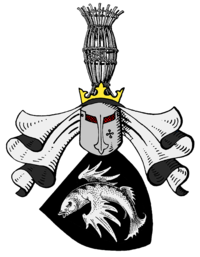Engelbert von Bettenbrock
Engelbert vondeckebrock (* before 1266 ; † 1298 ) was a knight , Burgmann zu Ahaus , droste of the cathedral chapter , aldermen of the city of Münster, treasurer of the canonical monastery with the Überwasserkirche in Münster and landowner.
Life
ancestry
Engelbert was a knight from the 4th generation of the noble family of Deckenbrock . Unlike his ancestors, many of his life dates have come down to us. His great-grandfather, the knight and landowner Bernhard I. vondeckebrock (mentioned in a document in 1209), was the tribe of the family later called Droste zu Hülshoff . He was a landowner at Everswinkel and had probably participated in the Third Crusade as a vassal of the Bishop of Münster Hermann II von Katzenelnbogen and of Emperor Friedrich Barbarossa . His grandfather Johann I, treasurer of the Bishop of Münster, and his father Johann II had inherited the estate near Everswinkel. Because the now powerful bishop of Munster refused to fortify them, they had increasingly withdrawn behind the safe walls of the city of Munster because of the " feud and predatory" period. Engelbert often appeared as a witness in documents and was the first family member to seal her with her coat of arms, the flying fish.
Engelbert married Adelheid von Langen (Westphalian noble family) , who came from the Langen family, also near Everswinkel . With her he had the sons Johann III. vondeckebrock (his successor), Dietrich and Heinrich as well as the daughter Margaretha. Engelbert served in 1268 as a castle man at Ahaus Castle on the border with the Netherlands, which belonged to the mighty Bernhard II of Ahaus and was of great importance to the Bishop of Münster .
First droste of the cathedral chapter of Münster
Engelbert Droste became the cathedral chapter of Münster in 1277 at the latest - an office that became hereditary and eponymous in three further generations of his family. As the noblest court office, this Drostenamt was not only responsible for the table of the cathedral chapter, which the bishop often attended, but also administered the largest wealth in the duchy of Münster . The cathedral chapter of Münster was one of the richest; Already in the early Middle Ages around 60–80 farms delivered their duties to its largest official court, the Brockhof. It was also one of the most powerful as it elected, supported, controlled and represented the bishop as the sovereign of the largest prince-bishopric in the empire. The drosten office of the cathedral chapter only existed until the end of the 14th century, while numerous other drosten offices, e.g. B. those of the official resignation of the prince-bishop, remained until the fall of the Holy Roman Empire and so z. B. founded the wealth of the "Erbdrosten" from the Droste family to Vischering. Both Droste families were only related to one another in 1729 through the marriage of Heinrich Wilhelm Droste zu Hülshoff to Anna Brigitta Droste zu Vischering .
Alderman in Munster
Engelbert had his residence in the city of Munster by 1284 at the latest , in which he, like his father and grandfather, had civil rights as an heir . Only heirs could be elected as lay judges or councilors and mayors in Münster - offices that many of his descendants held up to the 17th century. Engelbert was the first family member to be elected alder for the parish of Überwasser (Münster) .
Landowner and chamberlain of the Überwasser monastery
Engelbert had from his father John II. Of Deckenbrock the estate Grosse Deckenbrock ( Small Deckenbrock had received his brother) and other goods in Everswinkel inherited. Since 1288 he has also managed the Rötgering (Uppenberge) estate in Münster , making him treasurer of the canon monastery of the Überwasserkirche . The abbess transferred this property and house to him in 1295. The Überwasser Abbey was owned by King Heinrich III in 1040 . (HRR) with rich property and was consecrated in the presence of numerous bishops (including the future Pope Clement II ). Since then it has been run by women from the high nobility. The ceiling brook estate also paid taxes there; Small ceiling skirt passed into his possession in 1301 at the latest. Even after the acquisition of Hülshoff Castle (1417), thedeckebrock / Droste zu Hülshoff had their headquarters in the parish Überwasser until the 16th century and were buried in front of the choir in the Überwasserkirche.
literature
- Wilderich from Droste to Hülshoff : 900 years of Droste to Hülshoff . Verlag LPV Hortense von Gelmini, Horben 2018, ISBN 978-3-936509-16-8
- J. Holsenbürger: The gentlemen v. Eckenbrock (by Droste-Hülshoff) and their possessions. Münster iW 1869.
| personal data | |
|---|---|
| SURNAME | Engelbert von Bettenbrock |
| BRIEF DESCRIPTION | Knight, Burgmann zu Ahaus, Droste of the cathedral chapter, aldermen (historical) of the city of Münster, treasurer of the canonical monastery with the Überwasserkirche in Münster and landowner |
| DATE OF BIRTH | before 1266 |
| DATE OF DEATH | 1298 |

